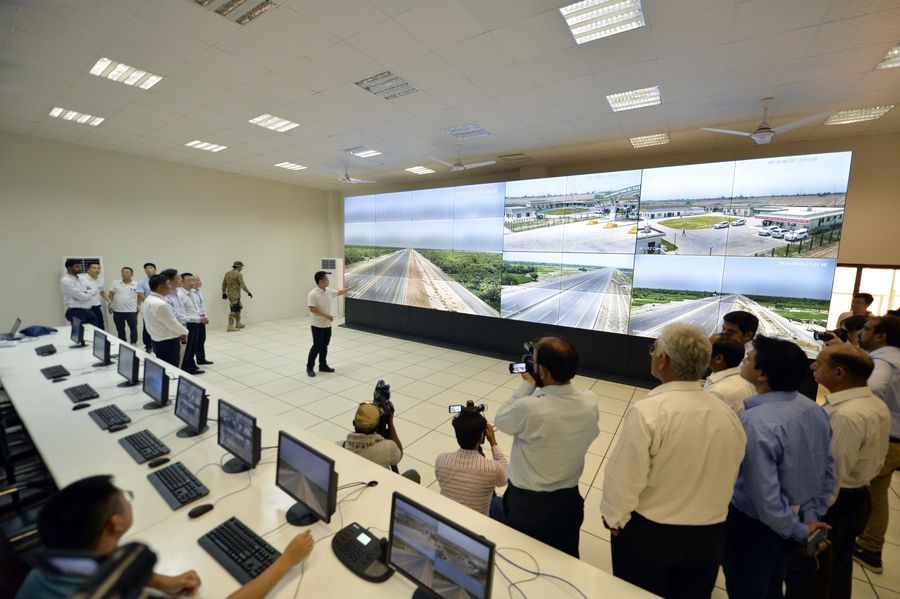
Arial photo taken on Aug. 5, 2019 shows the view of Sukkur-Multan Motorway in central Pakistan's Multan. The construction of the 392-km Sukkur-Multan Motorway, under the China-Pakistan Economic Corridor (CPEC) has been completed. (Xinhua/Ahmad Kamal)
The Sukkur-Multan motorway, as part of Pakistan's north-south traffic artery, will finally connect Peshawar with business hub Karachi.
It will unfold immense business opportunities for the central area by enabling local farmers to send commodities within the country and to the outside world.
by Misbah Saba Malik
ISLAMABAD, Sept. 20 (Xinhua) -- Tehseen Majeed used to work hundreds of miles away from her home in Pakistan's central city of Multan after completing her education, as she did not have any suitable job opportunity in her area at hometown.
"I was working in Islamabad, and would see my mother after two or sometimes three months when I travelled back to Multan. Life in boarding was also not easy, but I had to live it, because there was not even a single job opportunity for me as a contact manager in my hometown, until Chinese company set up its system in Multan to build Sukkur-Multan motorway," the 27-year-old woman told Xinhua.
She is one of about 28,900 local employees who took part in the construction of the recently completed Sukkur-Multan motorway -- a fraction of Peshawar to Karachi Motorway (PKM) project. The newly-built road is the largest infrastructure project under the China-Pakistan Economic Corridor (CPEC).
The China State Construction Engineering Corporation (CSCEC), constructor of the 392-km project, complete the motorway within a record period of 36 months, about two weeks ahead of schedule in extremely hot weather in center Pakistan.
Over 90 percent of the CSCEC's employees are local Pakistanis. Majeed's job is to maintain the road, for which she has to frequently visit the site in the scotching heat of 50 degrees Celsius.
However, she is happy to forgo her peaceful life working for previous employer in Islamabad to opt for her current challenging job as the respect and appreciation she is getting for her job now makes her work harder as her Chinese colleagues.
The road, which sneaks through the heart of Multan to Sukkur and finally will connect with the country's business hub Karachi, will unfold immense business opportunities for the country's center area by enabling local farmers to send commodities within the country and to the outside world.
Multan is rich in mangoes, which is fondly called as king of fruits in South Asia. Multan-grown mangoes are unique in its taste, with some varieties available only in the region. Apart from that, sugarcane, cotton, wheat, and a variety of vegetables are also grown in the area.
With the newly constructed motorway, which has shrunk the distance by almost half traveling from Multan to Sukkur, the district's connectivity with other parts of the country will be enhanced, enabling it to transport local commodities in a timely manner.
Makers of Multan's hand-embroidered clothes and hand-painted pottery, earthenware and camel-ware will also get benefit from the road network with a cheaper transportation cost.
The motorway has also equipped local people with modern skills besides giving them knowledge and experience to use modern machinery. Many local farmers are now skilled laborers with the help of the Chinese engineers working on the project.

Photo taken on Aug. 5, 2019 shows the monitoring room of Sukkur-Multan Motorway in central Pakistan's Multan. The construction of the 392-km Sukkur-Multan Motorway under the China-Pakistan Economic Corridor (CPEC) has been completed. (Xinhua/Ahmad Kamal)
Ammar Yasir Magsi, manager of project coordination at the Multan-Sukkur project, told Xinhua that working at the project was a dream job for Pakistanis where they were not only paid well, but also given exposure to the best technologies in the world.
"When an engineer or a worker has the name of CSCEC as work experience at his resume, it will contribute a lot for his future jobs. Many people who were living in far flung areas of Multan did not have any work opportunity except farming, but now after working at the renowned motorway project, door of opportunities have been opened on them," Magsi said.
Local analysts believe that by training about 3,000 people, the Chinese company has also helped the country's current government in its mission to produce more skilled labor in the country.
Alamdar Khan, a coordinator at the project, is associated with the field of road construction for the last two decades, but his three-year work with the Chinese company helped him learn the techniques, which he did not even hear in his whole life.
"In this project Chinese used drones to monitor the construction, their GPS is remarkable and their testing equipment is one of the best in the world, working with them was a training and a great skill development opportunity for me," Khan told Xinhua.
The project is now waiting for the country's National Highway Authority for formal inauguration, after which it will open up the major north-south traffic artery in central Pakistan, greatly improving the traffic of Pakistan, and bringing social and economic development of the areas along the transportation infrastructure.■



